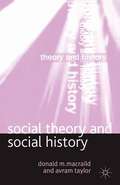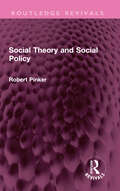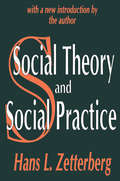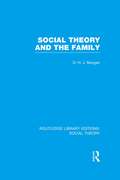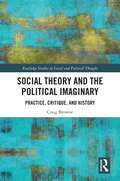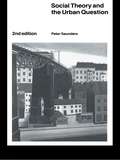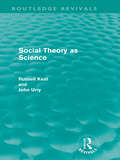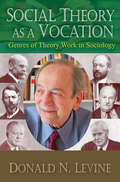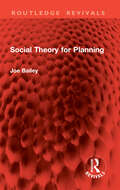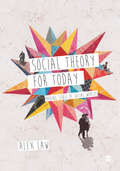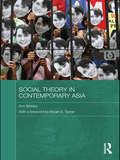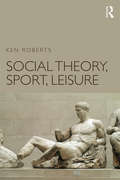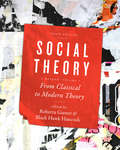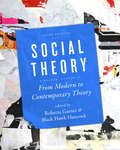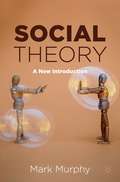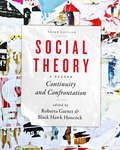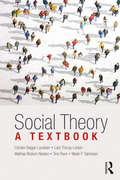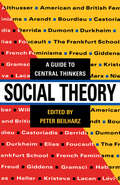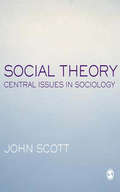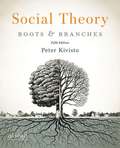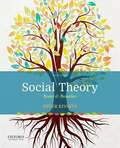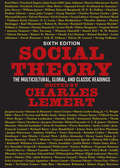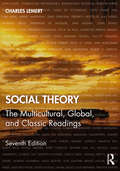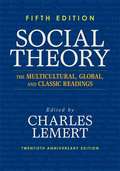- Table View
- List View
Social Theory and Religion
by James A. BeckfordMany aspects of religion are puzzling these days. This 2003 book looks at ways of improving our understanding of religious change by strengthening the links between social theory and the social scientific study of religion. It clarifies the social processes involved in constructing religion and non-religion in public and private life. Taking illustrations of the importance of these boundaries from studies of secularisation, religious diversity, globalisation, religious movements and self-identity, Beckford reviews social scientific knowledge about religion and assesses the strengths and weaknesses of a wide range of theoretical attempts to account for religious change and continuity. The discussion goes in two directions. The first is towards identifying ways in which studies of religion would benefit from taking better account of themes in recent social theory. The second is towards identifying reasons for social theorists to pay more attention to the findings of empirical investigations of religion.
Social Theory and Social History
by Donald M. Macraild Avram TaylorThe expansion of social history that took place in the twentieth century has produced some of the most exciting works in the field of historical studies. As the range of the social historian's concerns has grown, so has the range of methodologies and theoretical approaches they employ. Historians have made greater use of the theoretical insights of social scientists, and boundaries between the disciplines have become blurred as a consequence. Social Theory and Social History: - covers the major developments within social history - offers an introduction to the most important social theorists - discusses the relationship between history and the social sciences - considers the use of theory in the writing of history - examines current debates within historiography In this concise introductory guide, Donald M. MacRaild and Avram Taylor explore the complex relationship between social theory and social history, arguing that an awareness of the relation between the two is the key to a deeper understanding of the process of historical change.
Social Theory and Social Policy (Routledge Revivals)
by Robert PinkerOriginally published in 1971 and now reissued with a new Preface by John Offer this book examines the historical origins, (both institutional and academic) of social policy and administration and the theoretical contribution of such key figures in the development of the social sciences as Marx, Spencer, Weber and Durkheim. It then analyses the application of normative theory in this field; examines the concepts of exchange and stigma in social welfare; and looks at the idea of citizenship and the use of the social services. In a final section the author presents a number of models of social welfare.
Social Theory and Social Practice
by Hans L. ZetterbergSocial Theory and Social Practice is a unique effort at applied social theory. Hans L. Zetterberg believes that social research has now advanced so far that social scientists can give advice without being restricted to new research projects. They can use previously proven theories as the basis for sound practical recommendations. This approach has profound implications in the application of social science to problems in business management, labor strife, government decision-making, in such areas as education, health and human welfare. It remains a pioneering discourse for practitioners of social research and social policy.Zetterberg gives a searching review of the various ways in which social practitioners attempt to use the accumulated knowledge of social science. He proceeds with a compact summary of the knowledge of the academicians of social science, noting that practitioners are often unaware of much useful academic knowledge. The process by which this knowledge is transformed into practical advice is spelled out in detail, and is illustrated with examples from an actual consultation about problems faced by an art museum that wanted to increase its audience.Chapter 1 identifies the problem; chapter 2, "The Knowledge of Social Practitioners," outlines practitioners' reliance on scientific knowledge; chapter 3, "The Knowledge of Social Theorists," discusses sociological terms and sociological law; chapter 4, "The Practical Use of Social Theory through Scholarly Consultants," explores the actual specificity of social theory and its uses, while the concluding chapter examines the uses of consultants, covering some prerequisites for the successful use of applied science. The book rejects the widespread view that in order to put social science to use, we have to popularize its content. Zetterberg's approach is rather to translate a client's problem into a powerful theoretical statement, the solution to which is calculated and then presented to the client as down-to-earth advice.This volume will be of immediate interest to scholars in the field of social theory; to consultants and practitioners who give advice on social problems and policy decisions; and to executives who use advice from social scientists.
Social Theory and the Family (Routledge Library Editions: Social Theory)
by D.H.J. MorganAn experienced teacher of courses on the sociology of the family, D.H.J. Morgan frequently encounters a gulf between ‘the family’ as it is often treated in sociological texts and ‘the family’ as it is usually experienced. In this book he provides an extremely valuable bridge between the two by presenting an encounter between some of the mainstream theoretical approaches and concerns in the sociology of the family and what he terms as ‘critical’ perspectives on the family. This is the first British book on a basic social institution that takes into account the literature outside the mainstream of sociological analysis that deals with the subject. The first half examines the varieties of functional theorizing embedded in many texts, the over-concern with the question of kinship in modern society and the treatment of the family as a ‘success story’. In the second half Dr Morgan presents a critical account of some of the counter-theories: those derived from the radical feminist movement, the existential psycho-analytical approach associated with Laing, and the critical analyses of sex in an advanced capitalist society. A final chapter suggests some themes and orientations, derived from this encounter of theoretical approaches and modern perspectives, which can be usefully developed.
Social Theory and the Political Imaginary: Practice Critique, and History (Routledge Studies in Social and Political Thought)
by Craig BrowneSocial Theory and the Political Imaginary: Practice, Critique and History is an innovative work of synthesis, critique, and analysis. It presages a social theory perspective that recognises the constitutive significance of the political imaginary in modernity. Social theory’s current dilemmas are explored through a series of interlinked asssessments of some of its recent substantial strands, specifically, Luc Boltanski’s pragmatism and the wider ‘practical turn’, the perspectives of multiple modernities and global modernity, the outlook of social and political imaginaries, and critical social theory. The political imaginary’s reconfigurations are evident in the tensions of global modernity and original social theory interpretations are advanced of landmark instances of twenty-first century social contestation: the Hong Kong protests conditioned by threats to civil freedoms and a lack of self-determination, the radical democratic practices of anti-austerity movements contesting capitalist globalisation’s injustices, and the inverted cosmopolitanism of the 2005 French Riots challenging the oppression and inequalities experienced by immigrant communities and marginalised youth. These incisive applications of social theory and complementary conceptual innovations illuminate the vicissitudes of social struggles, political forms, and theoretical perspectives. Similarly, reflection on the political imaginary is found to enable a necessary rethinking of the interrelationship of practice, critique and history.
Social Theory and the Urban Question
by Peter SaundersFirst published in 1986. Routledge is an imprint of Taylor & Francis, an informa company.
Social Theory as Science (International Library Of Society Ser.)
by John Urry Russell KeatThis book, written by a philosopher interested in the problems of social science and scientific method, and a sociologist interested in the philosophy of science, presents a novel conception of how we should think about and carry out the scientific study of social life. This book combines an evaluation of different conceptions of the nature of science with an examination of important sociological theorists and frameworks. This second edition of the work was originally published in 1982.
Social Theory as a Vocation: Genres of Theory Work in Sociology
by Donald N. LevineIn this unprecedented collection, Donald N. Levine rejuvenates the field of social theory in the face of lagging institutional support. The work canvasses the universe of types of theory work in sociology and offers probing examples from his array of scholarly investigations.Social Theory as a Vocation throws fresh light on the texts of classic authors (Comte, Durkheim, Simmel, Weber, Park, Parsons, and Merton). Ranging widely, its substantive chapters deal with the sociology of strangers and the somatic dimensions of social conflict; the social functions of ambiguity and the use of metaphors in science; contemporary dilemmas of Ethiopian society; logical tensions in the ideas of freedom and reason; and the meaning of nationhood in our global era. The book includes Levine's transformative analysis of the field of Ethiopian studies, and his acclaimed interpretation of the discontents of modernity. It makes the bold move to merge philosophically informed analyses with empirical work.Finally, Levine focuses on what he views as the contemporary crisis of liberal education, and offers suggestions for ways to stimulate new efforts in teaching and learning to do social theory. This book is an integral contribution to social science collections and should be read by all interested in the future of the social sciences.
Social Theory for Planning (Routledge Revivals)
by Joe BaileyPlanners necessarily use theories of how society works. More often than not, however, these were left unstated or confused. As the scope of planning increased in the 1970s it became vital that planners adopted a more refined approach to the social life which they tried to influence.Originally published in 1975, Social Theory for Planning brings to the attention of an important group of sociology-users some of the latest developments and insights of social theory at the time. The emphasis is on the value of theory in defining planning problems in sociologically conscious terms rather than in solving them. The advantages of conflict theory, interpretative sociology, evolutionism and systems theory are assessed, and urban sociology and research methods are evaluated in the light of alternative social theories.The book also aims to reveal the implicit social theories that are assumed in the defining of particular planning problems and makes a plea for the explicit discussion of the theoretical implications of conventional planning knowledge.
Social Theory for Today: Making Sense of Social Worlds
by Alex LawThis book is distinctive for extending the usual sociological reach, reopening territory that has lain fallow, set aside from the well-ploughed fields of orthodox social theory. In doing so, Law not only produces fresh insight into familiar theorists but guards against collective forgetting of the sociological canon. - Professor Bridget Fowler, University of Glasgow "An excellent book, it will be welcomed and read widely by advanced undergraduates, postgraduates and scholars in sociology, cultural studies, social theory and beyond." - Professor Chris Shilling, University of Kent Social Theory for Today guides students through the ‘turns’ of past and present social theory as it attempts to wrestle with a recurring sense of crisis in social relations and social theory. Drawing on both classical and contemporary sources, Alex Law provides readers with a firm grasp of competing perspectives. Too often social theories attempt to dominate the field by casting rival theorists, past and present, as deluded fools, while the more familiar ‘big names’ in social theory are subject to ever-increasing commentary that runs in ever-decreasing circles. This survey of social theory and crisis lessens the temptation to engage in internal theoretical polemics and esoteric wordplay. Social theory must become practical and specific if it is to become a means of orientation for uncertain times. This is a must-read for upper level undergraduate and postgraduate students looking for a vibrant and extended understanding of social theory.
Social Theory in Contemporary Asia (Routledge Studies in Social and Political Thought)
by Ann BrooksPhilosophical debates around individualization and the implications for intimacy, reflexivity and identity have occupied a central part of social and cultural theorizing in the West in the last decade. In fact, late modernity has become conspicuously engaged with issues of intimacy, reflexivity and identity. The author analyses the relevance of these debates in the context of contemporary Asia and combines an analysis of significant social theorists including Beck, Giddens, Bourdieu, McNay, Adkins, and Ong with an application of these debates to social, political and cultural contexts. Drawing on empirical research, case studies, global reports, media and academic literature, the book provides a relevant, wide-ranging and contemporary analysis of the debates on Asian culture and society. In the Foreword to the book Bryan Turner comments: ‘Professor Brooks shows consequently that the intimate and emotional cultures that have been described by Anthony Giddens and Ulrich Beck with respect to the West have not arrived in Asia or at least that they have not become visible and permanent aspects of the social landscape.’
Social Theory, Sport, Leisure
by Ken RobertsKen Roberts’ Social Theory, Sport and Leisure offers a clear, compact primer in social theory for students needing to engage with the application of sociological perspectives to the study of sport and leisure. Written in a straightforward style and assuming no prior knowledge, the book offers a fresh and easy to read overview of sociology’s contribution to sport and leisure studies. Ordered chronologically, each chapter: Focuses on the work of a major social theorist and their most influential ideas Provides helpful historical and biographical detail to set the person and their thinking in contemporary context Identifies questions in sport and leisure on which the theory can shed useful light Considers how the ideas can be, or have been, applied in the study of sport and leisure Works as a self-contained unit, enabling students and lecturers to use the book flexibly according to their needs. Written by an outstanding sociologist of leisure and sport, this intelligent yet jargon-free textbook enables students to get to grips with a wide range of important concepts and understand their diverse applications. As such, it is essential reading for any course designed to explore the place and meaning of sport and leisure in society.
Social Theory, Volume I: From Classical to Modern Theory, Third Edition
by Black Hawk Hancock Roberta GarnerThe third edition of this popular reader reflects considerable changes. The framework for understanding theory as a set of conversations over time is maintained and deepened, pairing classical with contemporary readings to illustrate the ways in which theory continues to be reinterpreted over time. Volume I has been completely reorganized, with new contextual and biographical materials surrounding the primary readings, and end-of-chapter study guides that include key terms, discussion questions, and innovative classroom exercises. The result is a fresh and expansive take on social theory that foregrounds a plurality of perspectives and reflects contemporary trends in the field, while being an accessible and manageable teaching tool.
Social Theory, Volume II: From Modern to Contemporary Theory, Third Edition
by Black Hawk Hancock Roberta GarnerThe third edition of this popular reader reflects considerable changes. The framework for understanding theory as a set of conversations over time is maintained and deepened, but Volume II now begins with a focus on key transitional theorists who helped reconceive of classical theory in new ways. Extending from the classical tradition, chapters on race, gender, culture, media and globalization show how contemporary theory builds on the past even as it moves in new directions. New contextual and biographical materials surround the primary readings, and each chapter includes a study guide with key terms, discussion questions, and innovative classroom exercises. The result is a fresh and expansive take on social theory that foregrounds a plurality of perspectives and reflects contemporary trends in the field, while being an accessible and manageable teaching tool.
Social Theory: A New Introduction
by Mark MurphyThis textbook delivers a new thematic introduction to social theory that explores theoretical issues in their contemporary social contexts. Each chapter is devoted to a specific thematic area, including the state, governance, the economy, civil society, culture, language, knowledge, the self, emotions, the body, and social justice. Each chapter details the key issues for debate and the relevant theories while linking those debates and theories to everyday life. Distributed throughout the chapters are focused sections on key concepts and their research applications, alongside helpful additional detail including a glossary, further suggested readings, chapter summaries, and questions for discussion. The book also provides useful information on key theoretical movements such as feminism, Marxism, and post-structuralism, as well as biographies of key theorists. As such, it reflects the breadth of social theory and its interdisciplinary nature by drawing on thinkers not just from sociology, but also from philosophy, history, literature, geography, cultural and gender studies.The book’s logical structure and clear pedagogical features make it an appealing and accessible introductory text for students new to social theory. The chapters demonstrate the relevance of social theory to everyday life, such that readers can understand and actively engage with key concepts.
Social Theory: A Reader, Third Edition
by Black Hawk Hancock Roberta GarnerThe third edition of this popular reader reflects considerable changes. With over seventy readings representing a wide diversity of theorists, it offers a breadth of coverage not available in other collections. The framework for understanding theory as a set of conversations over time is maintained and deepened, with a focus on key transitional theorists who helped pave the way from classical to contemporary theory. New contextual and biographical materials surround the primary readings, and each chapter includes a study guide with key terms, discussion questions, and innovative classroom exercises. The result is a fresh and expansive take on social theory that foregrounds a plurality of perspectives and defines contemporary trends in the field, while being both an accessible and manageable teaching tool.
Social Theory: A Textbook
by Lars Thorup Larsen Mads P. Sørensen Mathias Wullum Nielsen Tine Ravn Carsten Bagge LaustsenThis textbook offers a new approach to understanding social theory. Framed around paired theoretical perspectives on a series of sociological problems, the book shows how distinctive viewpoints shed light on different facets of social phenomena. The book includes sociology’s "founding fathers", major 20th-century thinkers and recent voices such as Butler and Zizek. Philosophically grounded and focused on interpretation and analysis, the book provides a clear understanding of theory’s scope while developing students’ skills in evaluating, applying and comparing theories.
Social Theory: A guide to central thinkers
by Peter Beilharz'An alluvial goldfield of social theorists - nuggets lying around all over the place.'Bob ConnellWho's who in the social theory zoo? This book introduces some of the leading social theorists in short, lively entries by leading Australian scholars. Social Theory covers thinkers from Althusser to Williams, by locals from Alexander to Yeatman.For beginner and enthusiast alike, it gives a sense of the state of the art in classical and modern social theory. Social Theory is an indispensable reference for undergraduates, postgraduates, academics and anyone else interested in the ideas behind social and political theory and cultural studies today.
Social Theory: Central Issues in Sociology
by John Scott"John Scott has provided us with an encyclopaedic tour through the foundations and development of social theory which cautions against the contemporary fragmentation of academic work and demonstrates the continued value of sociology's heritage. The book will become a key resource for students and scholars alike." - Barry Smart, Portsmouth University This is a comprehensive, critical review of social theory that places leading contributions in their larger context. Written predominantly for students, the scope and range of the subjects and authors dealt with results in one of the most comprehensive introductions to social theory published to date. Ranging from the philosophical foundations of sociology and the discovery of 'the social' to distinctive sociological approaches, to the significance of issues pertaining to gender and patriarchy, to questions of modernity and post-modernity, the book is comprehensive in subject matter. Among the distinctive features of the book are: Clarity of exposition from a well-known and respected commentator in the field Focus boxes to facilitate comprehension Tremendous range of material Powerful organization of the material around key organizing principles The book is a major accomplishment which will quickly establish itself as the key set text in Sociology and Social Theory courses.
Social Theory: Roots And Branches (Fifth Edition)
by Peter KivistoEdited by Peter Kivisto, this acclaimed collection of accessible primary source readings enables students to experience "firsthand" a wide range of perspectives that are shaping current sociological theory. Now in its fifth edition, Social Theory: Roots and Branches covers both classical theory (the roots) and contemporary theory (the branches) and shows how they are linked. Part One features work from such well-known classical theorists as Marx, Durkheim, Weber, and Simmel. It also presents selections by theorists outside of the discipline and from writers who are often overlooked in competing collections, including W. E. B. Du Bois, Charlotte Perkins Gilman, and Harriet Martineau. Part Two offers readings that illustrate major contemporary theoretical approaches, ending with a section on cutting-edge directions in theoretical discourse. Now featuring a revised and expanded introductory chapter, this fifth edition offers seventeen new readings, including eight by theorists who are new to this collection.
Social Theory: Roots and Branches
by Peter KivistoEdited by Peter J. Kivisto, this acclaimed collection of accessible primary source readings enables students to experience "firsthand" a wide range of perspectives that are shaping current sociological theory. <p><p> Now in its sixth edition, Social Theory: Roots and Branches covers both classical theory (the roots) and contemporary theory (the branches) and shows how they are linked. Part One features work from such well-known classical theorists as Marx, Durkheim, Weber, and Simmel. It also presents selections by theorists outside of the discipline and from writers who are often overlooked in competing collections, including W. E. B. Du Bois, Charlotte Perkins Gilman, and Harriet Martineau. Part Two offers readings that illustrate major contemporary theoretical approaches, ending with a section on cutting-edge directions in theoretical discourse.
Social Theory: The Multicultural, Global, and Classic Readings
by Charles LemertFor nearly a quarter-century, Charles Lemert has shared his love of social theory, and the questions it explores, in this collection of readings. With 140 selections that begin in the nineteenth century and end in 2015, Social Theory charts the long arc of the development of the field. This edition retains classic texts by Karl Marx, Emile Durkheim, Max Weber, and W.E.B. Du Bois and writings of major contemporary figures like Audre Lorde and Patricia Hill Collins, while adding pieces from Harriet Martineau, Friedrich Nietzsche, Kimberlé Williams Crenshaw, Thomas Piketty, and Ta-Nehisi Coates, among others. Revised and updated with a new section exploring social theory at the limits of the social, Lemert's Social Theory remains essential reading.
Social Theory: The Multicultural, Global, and Classic Readings
by Charles LemertSocial Theory is more than a reader. Feminists, race theorists, decolonizing leaders, and others are thoughtfully introduced by Charles Lemert’s substantial commentaries. Social Theory has always sought to keep up with the new while respecting the old—from Durkheim and Weber to Latinx and LGBTQ pioneers. When the book first appeared it was, as it remains, a collection of selections from those who have changed how we think about social things. Today, as the world is threatened by a global wave of anti-democratic movements, Social Theory adds a new early section to remind us of the origins of democratic values in 1700s. A new concluding section focuses the theoretical mind on how, in the 2020s, social theorists are rethinking the world in order to better understand and resist the menace of anti-democratic movements.
Social Theory: The Multicultural, Global, and Classic Readings (Fifth Edition)
by Charles LemertFor over twenty years Charles Lemert has scoured the canon of social theory, pulling together long-established classics as well as engaging modern writing to create an essential collection of social theory from the nineteenth century to the present. In this heavily revised fifth edition, Lemert reevaluates the received canon and reasserts this iconic text's place in the standard curriculum. Classic, essential texts from thinkers like Marx, Durkheim, and James remain; other key writers, like Dewey and Connell, are presented in a new light; and leading figures in the discussion of twenty-first-century society, such as Elijah Anderson and Bruno Latour, are anthologized here for the first time. In addition to classic and multicultural readings, the new fifth edition introduces a discussion of global social theory as well as important new and evolving topics like mobile technologies, the virtual realm, masculinities, and bare life. For the first time, timelines are included to visually present readings against the backdrop of significant events in social and world history. With more than 100 authors, thinkers, and scholars represented, the fifth edition of Social Theory is an essential component of any course on social theory.

